Farmers in Ukraine are dealing with landmines, occupied territories and cut-off transportation lines. The lack of food coming out of the region is contributing to global food insecurity. Despite the challenges, many farmers say they just want to return to their fields.
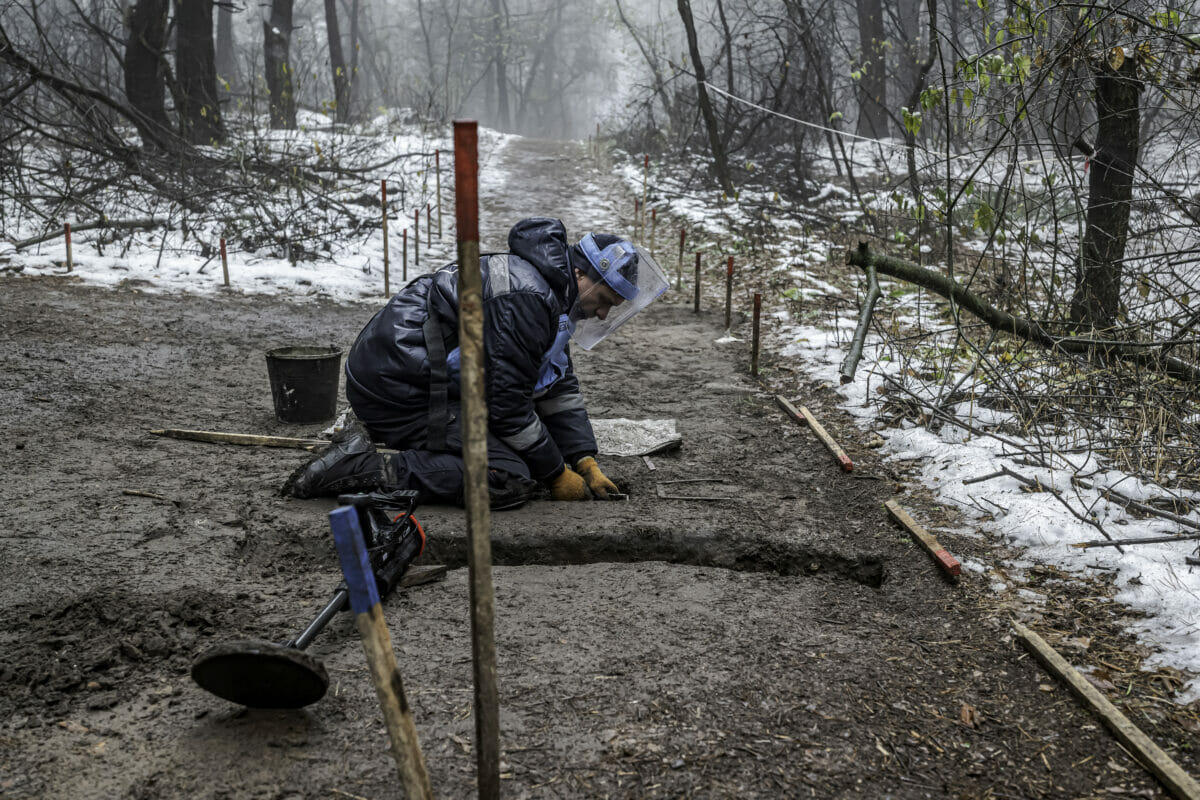
When Ihor Mistiuk learned of the Russian invasion of Ukraine on Feb 23, 2022, he didn’t panic. He was concerned, of course. But he tried to stay calm.
Within a week, soldiers had come to his village near Zaporizhzhya, in south-east Ukraine. He started hearing of bombs dropping and deaths rising in cities such as Kyiv. He even saw bombs hitting an airfield close to his house, all the while growing increasingly worried.
Still, he was composed. Soldiers were now occupying most of the homes near him, and had cut off the ability to move freely. That was tough for Mistiuk, who farmed wheat, sunflowers and legumes over about 500 hectares of land.
At one point, Mistiuk and his father had to prepare grain for their chickens, and they needed to drive to the grain shed. On the way there, a soldier “started interrogating us. He searched our car for bullets. He didn’t find any, and he allowed us to keep going, but still, those soldiers were quite dangerous. They threatened to shell the city and kill everybody,” Mistiuk says through a translator provided by PR Army.
It was a month into the full-scale invasion, and supplies were running low. When Mistiuk realized he didn’t have enough food for his then-eight-month-old daughter, the panic finally set in. He knew his family had to flee to Ukrainian-controlled territory.
“Of course, this was not easy,” Mistiuk says, now settled in Lviv. “They interrogated us a lot at the border, but we still managed to escape.”
Mistiuk is one of the lucky ones. Some estimates put the number of killed or injured civilians at more than 25,000, with millions more impacted. Across Europe, more than eight million Ukrainian refugees have been recorded in border countries such as Poland and Slovakia. As the occupation drags on, farm fields have been left to fallow or, worse, been destroyed. Many fields are now littered with landmines and explosives. Ukraine is one of the world’s top producers of wheat, sunflower and barley. Without these crucial ingredients making their way out through the Black Sea, global prices for the commodities rose dramatically and fueled food insecurity. In Ukraine, a country heavily dependent on agriculture, the losses in the sector are estimated to reach nearly $9 billion. The damage to bombed and shelled granaries was so severe that the Kyiv School of Economics estimates losses of roughly 12 million tons of grain.
Now, in the midst of spring planting season, many farmers must decide if working their fields is worth the risk.

Ihor Mistiuk with his family. Photography submitted.
Traversing the minefield
Farmers in Ukraine can generally be sorted into three groups. The first, like Mistiuk, have been displaced from their farms. Either their land has been destroyed or it is in the remaining occupied territory, mainly along the southern and eastern borders of the country. The second group of farmers still have access to their lands, but they have been unable to get their crops out of the country effectively. The usual ports of export have been blocked; trains through Poland, Slovakia and Hungary have been banned at times, causing bottlenecks and wildly fluctuating grain prices in central Europe. Ports along the Black Sea have also been difficult to traverse, with the port in Mariupol under occupation, and others near Kherson and Donetsk closed. One of the only remaining ports is in Odesa, but shipments out have been slowed. A UN-backed deal, which allows ships hauling grain to pass through the port, has been under threat, though there are reports that Russia has extended it for 60 days. Without access to that grain, some of the most food-insecure countries, such as Somalia, move closer to famine.
Andriy Dykun, head of the Ukrainian Agri Council, says that, ironically, farmers are now dealing with spoiled grain. “We can store it, but we cannot export it out due to the logistics. And, of course, some of the grain spoiled in the occupied territories because of the bombing on the warehouses and grain silos.” But there’s no way of knowing just how much grain spoiled or stolen.
So, the first two groups of farmers either have no land to farm or have nowhere to send their crops. But the third group is dealing with something far more dangerous: landmines—thousands of them.
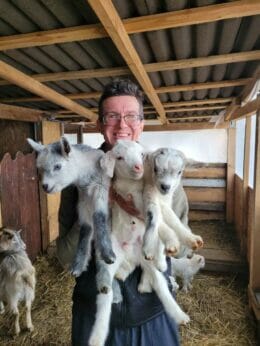
Oleksandr Schelokov with some of his goats. Photography submitted.
Oleksandr Schelokov, a dairy farmer near Kyiv, has come to know the landmines intimately. “Just yesterday, we found a mine in the forest. It’s the only place I can go with my goats, and there are a lot of mines still left,” Schelokov explains through a translator. “Bombs can go off anywhere in Kyiv, almost anytime. But I’m most afraid of the minefields and the forests.”
On the night of the invasion in February, Schelokov didn’t hesitate. His farm is too close to Kyiv, and the bombing was immediate. He gathered his wife, three daughters and other family and neighbors and tried to take shelter in his house. However, they lost power and water quickly. Schelokov knew they had to flee.
“As the bombing grew..my daughters were very afraid,” says Schelokov. “We first tried to go on the highway, but it was closed by Russians. Then we fled through the fields.” Schelokov made the difficult decision to split his family up. Half went up towards Kyiv and the other half south, towards Uman. But Schelokov turned around and went home.
“I returned to the farm. I was responsible for all of these animals. And they were without food, without water. Those animals needed me. I saw some of my neighbors had just opened the gates of their farms and their animals were in the wild. Those animals died very early because of the bombs. At that time, I felt a heavy weight, a tightness.”
Before the invasion, Schelokov had cows and goats in his dairy, spread out over three locations on the outskirts of Kyiv. Two of his farms were completely destroyed, including those animals. The guilt that he still feels about that is palpable. He says he has roughly 38 cows and two dozen goats remaining on the third site, where his family home stands. He hopes to grow his herds this year and restore his farms, replacing both animals and destroyed equipment. However, it will be a long project to take on, as his farm is surrounded by landmines. “There is no safety here at all,” he says.
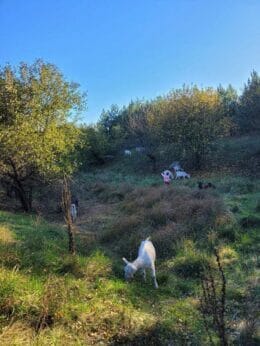
Schelokov now has to run his goats through nearby forests, which also have landmines. Photography submitted.
Outside help
One of the many difficulties that farmers like Schelokov face is that there’s no way of knowing how many landmines and explosives await them across the country. Humanitarian aid organizations have come into the country to start demining efforts, but there aren’t reliable estimates for the actual mines they face. They only know that the demining work will take years.
One of those companies is FMC Corporation, a global ag-tech company headquartered in the US, but with offices worldwide. The company is working with The HALO Trust, a humanitarian agency that demines areas in former warzones. FMC will support the HALO team monetarily; 3% of the revenue they generate in Ukraine will go to demining efforts. President and CEO Mark Douglas says the entire FMC team understands that this is simply the beginning of the support it intends to offer. “I think we’ll learn a lot in 2023, in terms of how HALO works and what we need to fund. But as we go through 2024, 2025, 2026 and, hopefully, conditions improve and we get some form of resolution in Ukraine, that’s when the accelerated work will really begin.”
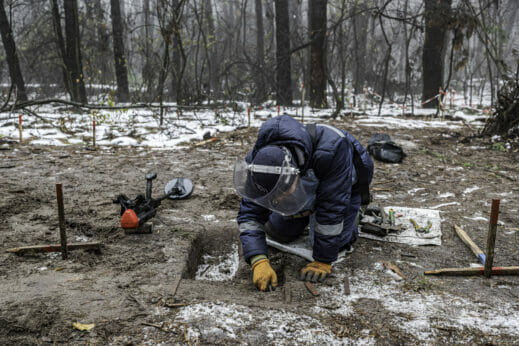
Landmine Clearance by The HALO Trust team. Photography by Chris Strickland via The HALO Trust.
In addition to financially supporting the demining efforts, FMC shut down its entire operations team in Russia within two weeks of the invasion. Douglas says it was, in part, a humanitarian decision. The company gave all the assets of its plant to the general manager and left. But it was also, in part, a business decision, and it wasn’t an easy one. There were approximately 80 Russian employees that were left behind. There was the financial impact of leaving a market so abruptly—it cost the company roughly $25 million.
“I’ve never had a discussion before with my president of the [European division] where we were buying satellite phones and bulletproof vests and other equipment for our employees. That’s not the normal course of business,” says Douglas. “When you’re in that discussion, something has to change. Does it feel good? It feels good that we’re doing the right thing for our people. And we’re doing the right thing for the people of Ukraine.”
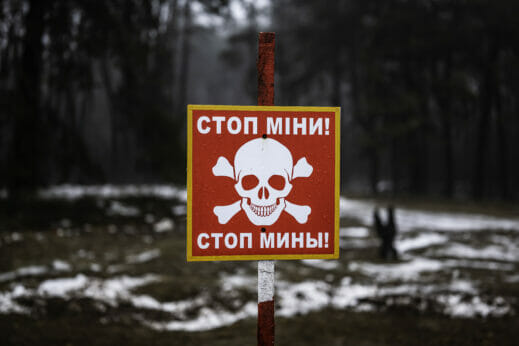
Photography by Chris Strickland via The HALO Trust
The Ukrainian Agri Council’s Dykun says mines are the major impediment for farmers across the country at this point, followed by a lack of transportation—namely pickup trucks. Lightweight vehicles such as pickups are easy for farmers to operate and transport their grain in, and the Council is now looking for vehicles from Europe or even through the US and Canada that they can transport to Ukraine to aid.
“For us to leave Ukraine and live somewhere else, it is not our choice,” says Dykun. “It’s very difficult, but it’s not a matter of earning money, it’s a matter of survival. So we are one year in, and we cannot just leave.”
Even farmers like Schelokov, who are back on their farms, aren’t able to produce much or make money. “There is no profit. I do not make money on the farm. Friends and relatives actually helped me financially, and charitable foundations keep me going. They helped me buy ten more goats and feed.” But between the cost of running his dairy and staying safe (Schelokov’s eldest daughters are in other countries for school, and much of his family is still scattered), there’s no profit to speak of yet.
Still, he’s back on his farm. For farmers like Mistiuk, there’s not much to do but wait. He estimates that it could take ten or 15 years to get his operation back up and running. His equipment was destroyed, and his fields are full of landmines. “I have acquaintances from Kherson, which was liberated in the autumn, and they told me that they had to pay $200 or $300 for one hectare [of demining]. Imagine paying for my [500] hectares?”
Until then, Mistiuk and his wife and toddler wait in Lviv. Mistiuk takes on odd jobs and has worked at a friend’s farm for now, until he can get back to his own home. And he waits. “I feel that the war has kind of frozen us,” says Mistiuk. “The topic of the war in Ukraine gets less and less attention from the public, and, eventually, the world can forget about us. That is a pity, but still people continue to live. They do not have any choice but to live.”
In all cases, we need to be calm to deal with problems, even war.
Hope the war is over soon, but sadly believe it will go on for some time.
Sad but predictable result of completely violating the Minske accords. We would invade Mexico if they had Russian army bases. Seems like this could have been avoided pretty easily.